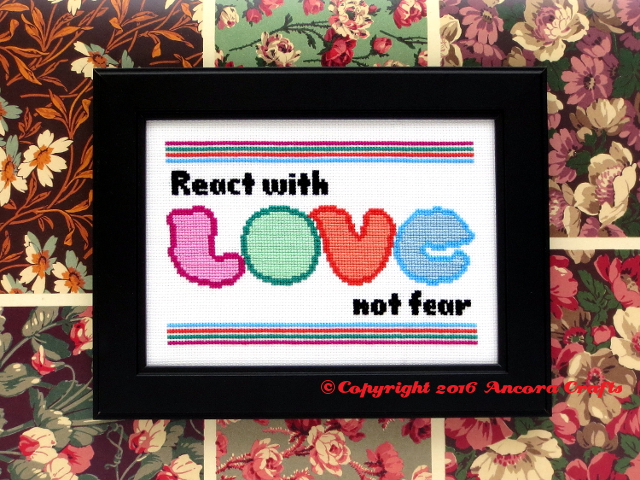This React with love cross stitch pattern is now available in my Etsy shop!
This project is my reaction to the enmity, conflict, and ignorance in the world. If we react to certain situations in a positive way, toward kindness, trust, and understanding, the world might be a happier, more constructive place. [Of course, there are situations where love is not the immediate answer. For example, I don’t advocate welcoming physical threats to ourselves, our families, or our friends. That’s not what I’m addressing here.]
It can be overwhelming as there is so much conflict out there: between religions, between nations, between political parties, between neighbors, between co-workers, and even within our families. I find that concentrating on individuals rather than groups helps alleviate some of that overwhelmed feeling. Every two people have something in common, if only the fact that we exist. Even from a meager beginning we can develop our commonalities into a better understanding. This project can serve as a gentle reminder to work toward this goal.
In an interesting coincidence, a conflict has come up between me and a good friend while I’ve been writing this post. This friend said that putting all Muslims on American soil into internment camps, much like the US did to people of Japanese ancestry during World War II, is a good idea. I was flabbergasted and deeply disappointed; how could someone I consider a friend espouse such a ugly, fearful idea?
My reaction? To be perfectly honest, my first reaction was not “with love.” It was disgust and exasperation as my husband and I argued fruitlessly against his idea. The next day, my reminder to “react with love not fear” kicked in as I started really thinking about what to do next.
My main thought was: EDUCATE MYSELF. Because I didn’t have the best information on hand at the time, I didn’t know how to respond intelligently or even coherently when my friend first brought up his awful idea.
I feel there are two big points to address: the first is about Islam and Muslims vs. radicalized Muslims, and the second is about the about the idea of internment camps. I happen to be friends with a really lovely Muslim couple, and I will ask if they can lead me to information that will address the first point. As for the second point, I happen to know that Japanese-American actor George Takei (he played Sulu on Star Trek) was in an internment camp as a child during WWII. He is an internet powerhouse and a champion of fighting the idea of internment camps, so I will search the internet for his most persuasive arguments on the subject.
Will I then share these pieces of information with my friend? You bet. How will I do it? I’ll present the clearest, most succinct and rational ideas I can find and ask him to read them. Will he read them? Maybe not, but this is a person who generally respects my ideas, so I have hope that he will. Will this information change his mind? I don’t know, and that has to be okay.
Even if he doesn’t change his mind, my understanding of two big topics will expand. In the future, if I am confronted by anyone else with similar prejudices, I will be better able to react with love and in a more constructive way.
My story above is just a tiny instance of conflict between a handful of people. Think globally and look at a situation as complex as the unrest in the Middle East. There are thousands of years of root causes of the violence there, from religious differences to political upheaval, from oil to opium, and countless more. It would take a multitude of scholars’ lifetimes to unravel the web of conflicts and truly understand all of the major points of view. How does one react with love toward something this overwhelming?
Obviously, there are no simple answers (how I wish there were). But this is a good example where focusing on individuals rather than groups helps me. I find myself often thinking about war refugees and their situations. If we act toward a refugee family with fear, with ignorance, distrust, and isolation, then they may have good reason to become our enemies. However, if we greet the family with love, with a desire to understand them better, with kindness and compassion and with opportunities for work and education, then they may have have good reason to become our friends.
Like I said above, every two people have something in common, if only the fact that we exist. The most simple acts of kindness can open up channels of understanding between people. I hope that this react with love cross stitch pattern may help remind us of that idea.
